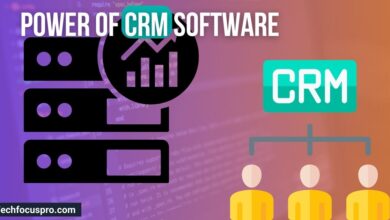What are the Top Quantum App Development Software?

Quantum computing represents a monumental leap in computing power, relying on the principles of quantum mechanics. Unlike classical computers, which use bits to process information as 0s and 1s, quantum computers use qubits.
Qubits can represent and process a vast amount of data simultaneously, thanks to properties such as superposition and entanglement. This unique capability holds the potential to solve complex problems much faster than traditional computers.
The significance of quantum computing lies in its potential to revolutionize various industries, from cryptography and material science to artificial intelligence and pharmaceuticals. By providing solutions to currently intractable problems, quantum computing can accelerate innovation and efficiency in these fields.
Developing applications for quantum computers is essential to harnessing their full potential. As quantum hardware continues evolving, the need for application development becomes more critical. Quantum App Development involves creating software that can run on quantum systems, making it accessible and practical for real-world use.
This development is vital for transitioning from theoretical potential to tangible benefits, enabling industries to solve problems more efficiently and uncover new opportunities.
What are the Criteria for Evaluating Quantum App Development Software?
Performance
Performance refers to how well a quantum app development software can handle computations and execute quantum algorithms. To evaluate performance, consider how efficiently the software processes data and the speed at which it can solve complex problems. High-performance software will optimize qubits and quantum gates, ensuring faster and more accurate results.
Usability
Usability evaluates the ease of use and intuitiveness of the software for developers. Clear instructions, in-depth tutorials, and an intuitive user interface are all essential components of good quantum app development software. With this approach, novice and seasoned developers should find it easier to write, test, and debug quantum algorithms.
Compatibility
Compatibility is how well the software works with different quantum hardware and classical systems. Ideal software should support multiple quantum platforms and seamlessly integrate with existing tools and technologies. This ensures developers can work across various environments and maximise the available quantum resources.
Support and Documentation
Support and documentation address the resources and assistance that are available to developers. Comprehensive documentation, such as user manuals, frequently asked questions, and code samples, should be included with high-quality software.
A lively user community and attentive customer service are essential for sharing best practices and assisting with issues. This facilitates developers’ ability to overcome obstacles and improve their abilities.
Top Quantum App Development Software
IBM Quantum Experience
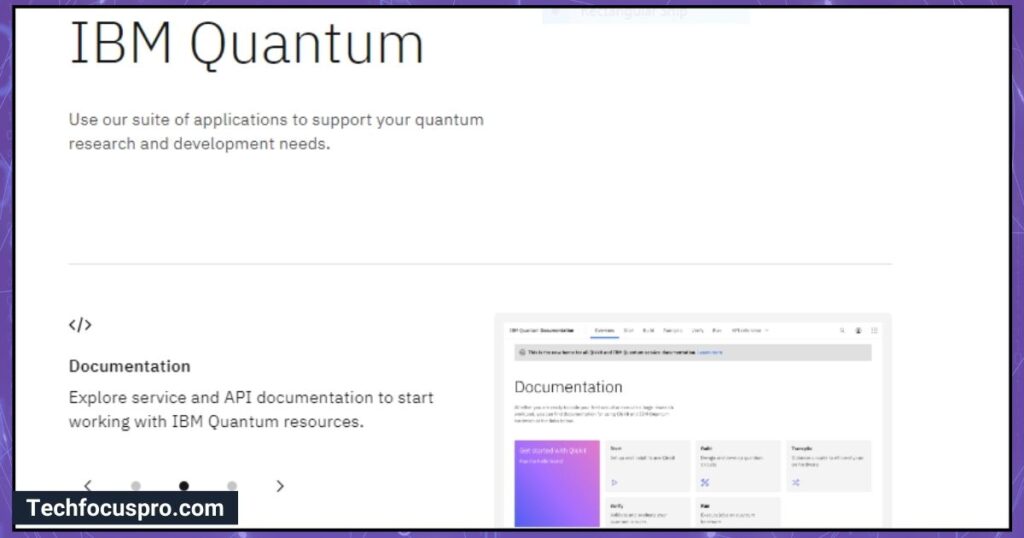
Users can investigate and interact with quantum computing technologies on the easily accessible IBM Quantum Experience website. It offers a suite of tools for creating, executing, and testing quantum algorithms and cloud-based access to IBM’s actual quantum computers.
The platform makes quantum computing more accessible to a broader variety of users by being made for research, education, and professional development.
- Key Features:
- Quantum Processors: Access to IBM’s fleet of quantum computers.
- Qiskit: An open-source quantum computing software development framework.
- Visualization Tools: Tools for visualizing quantum circuits and results.
- Educational Resources: Tutorials, courses, and documentation to help users learn quantum computing.
- Cloud Access: Ability to run quantum algorithms on actual quantum hardware over the cloud.
- Pros:
- User-Friendly Interface: Easy to use, even for those new to quantum computing.
- Extensive Learning Resources: Comprehensive tutorials and guides that make learning straightforward.
- Community Support: Strong community and customer support for troubleshooting and best practices.
- Open-Source Framework: Qiskit supports collaboration and innovation through its open-source nature.
- Authentic Quantum Hardware: Opportunity to run experiments on real quantum computers.
- Cons:
- Limited Free Access: Free tier usage has limitations; more extensive use requires a paid plan.
- Steep Learning Curve: Mastering quantum computing concepts can be challenging despite resources.
- Performance Constraints: Current quantum hardware has limitations in qubit count and coherence times.
Microsoft Quantum Development Kit
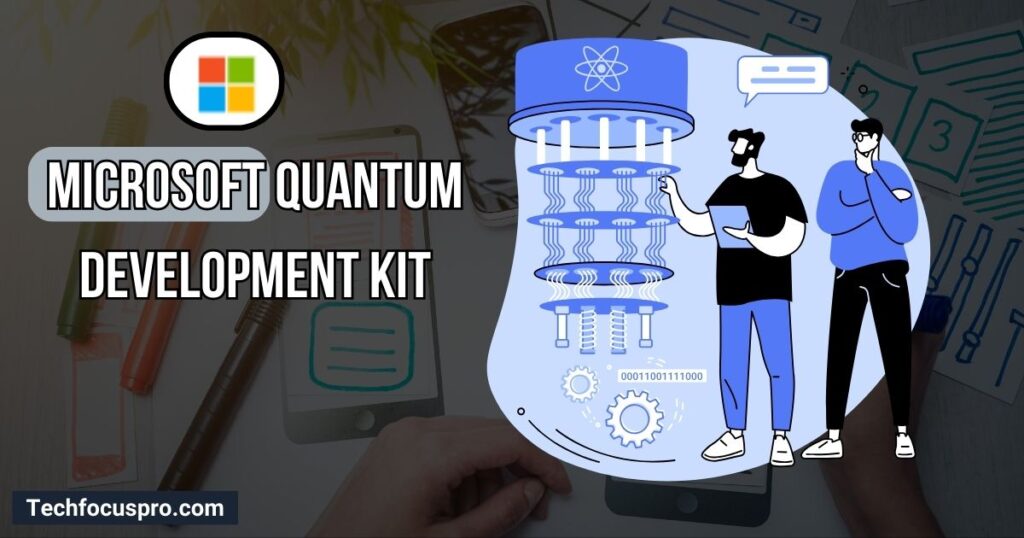
A complete set of tools called the Microsoft Quantum Development Kit is intended to make creating quantum software easier. It includes all the necessary components for designing, simulating, and testing quantum applications on Microsoft’s quantum computing platform. The kit’s goal is to increase the efficiency and accessibility of quantum development, especially for individuals unfamiliar with it.
Key Features
- Q# Programming Language: A specialized language for expressing quantum algorithms.
- Quantum Simulators: Tools for simulating quantum algorithms on classical computers to test and debug them without needing quantum hardware.
- Integration with Visual Studio and VS Code: Streamline the creation of quantum applications with seamless integration with well-known development environments.
- Quantum Libraries: A group of libraries designed to make using quantum algorithms easier.
- Documentation and Tutorials: Detailed resources to assist developers in learning and mastering quantum programming through tutorials and documentation.
Pros
- User-Friendly: Beginners can quickly grasp it thanks to its comprehensive documentation and simple tutorials.
- Powerful Simulators: Enables testing and debugging of quantum algorithms without immediate access to quantum hardware.
- Seamless Integration: Works smoothly with Visual Studio and Visual Studio Code, popular tools among developers.
- Rich Libraries: Provides a wealth of libraries that help simplify complex quantum programming tasks.
- Community Support: Backed by a strong community and responsive support, fostering collaboration and innovation.
Cons
- Learning Curve: Quantum programming concepts can still be challenging, even with good resources.
- Performance Limitations: Classical computing limits restrict the performance of simulators, which may not fully represent real quantum hardware capabilities.
- Access to Quantum Hardware: Unlike other platforms that provide cloud-based quantum computing, access to actual quantum hardware could be restricted.
Overall, the Microsoft Quantum Development Kit is an invaluable resource for anyone interested in learning more about quantum computing. It offers a comprehensive collection of tools and materials to streamline the development process.
Also Read: What are the Top Makeup Artist Software?
Google Cirq
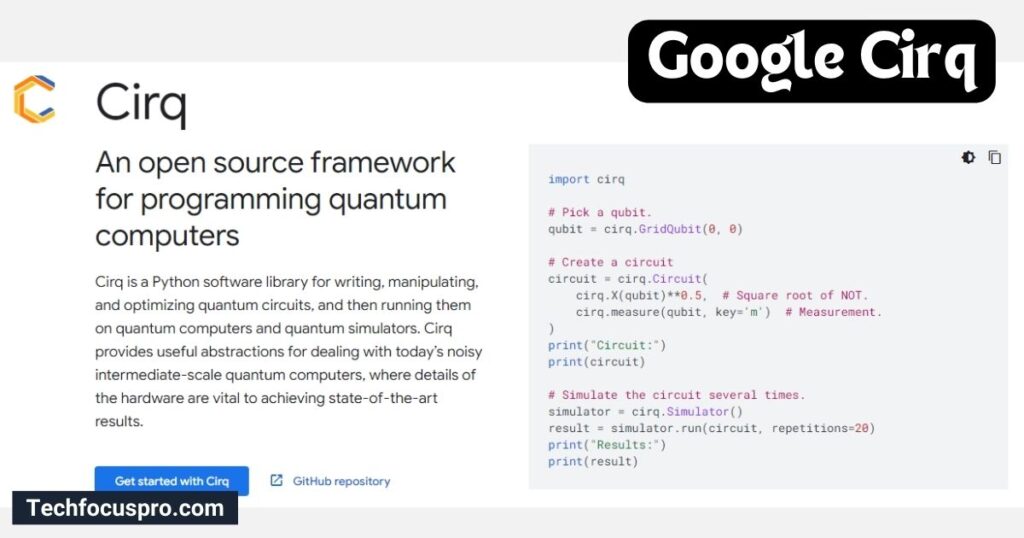
Overview: Google created the open-source Google Cirq framework to design, simulate, and run quantum circuits. Its main goal is to give users the tools to work with Google’s quantum processors and algorithms. For researchers and hobbyists interested in quantum computing, Cirq provides a robust yet intuitive interface.
Key Features
- Circuit Creation: Simple tools for building quantum circuits with clear and intuitive syntax.
- Simulation Tools: On traditional computers, simulators aid in the testing and debugging quantum algorithms.
- Integration with TensorFlow Quantum: TensorFlow Quantum integrates smoothly with quantum computing-based machine learning applications.
- Noise Models: Tools that replicate the noisy environments of actual quantum technology, known as noise models, enable more accurate testing.
- Qubit Management: Enhanced capabilities designed specifically for Google’s quantum technology to manage qubits and their interconnection.
Pros
- User-friendly: Because of its comprehensive documentation and practical lessons, it’s simple for novices and professionals to start.
- Powerful Simulations: State-of-the-art simulation tools that allow one to create and test quantum circuits without real quantum hardware.
- Integration with TensorFlow: Facilitates the fusion of quantum computing with machine learning, opening doors to innovative applications.
- Open Source: Being open-source, it encourages community contributions and frequent updates, ensuring continuous improvement.
Cons
- Quantum Hardware Access: Direct access to Google’s quantum hardware might be restricted or require specific partnerships.
- Learning Curve: Despite the user-friendly design, understanding quantum algorithms and their intricacies can be complex.
- Performance Constraints: Classical simulations can’t perfectly mimic real quantum hardware’s performance limitations like other simulators.
All things considered, Google Cirq distinguishes itself as a flexible and easily navigable platform for quantum computing development, facilitating developers’ experimentation, education, and innovation in the field.
Rigetti Forest
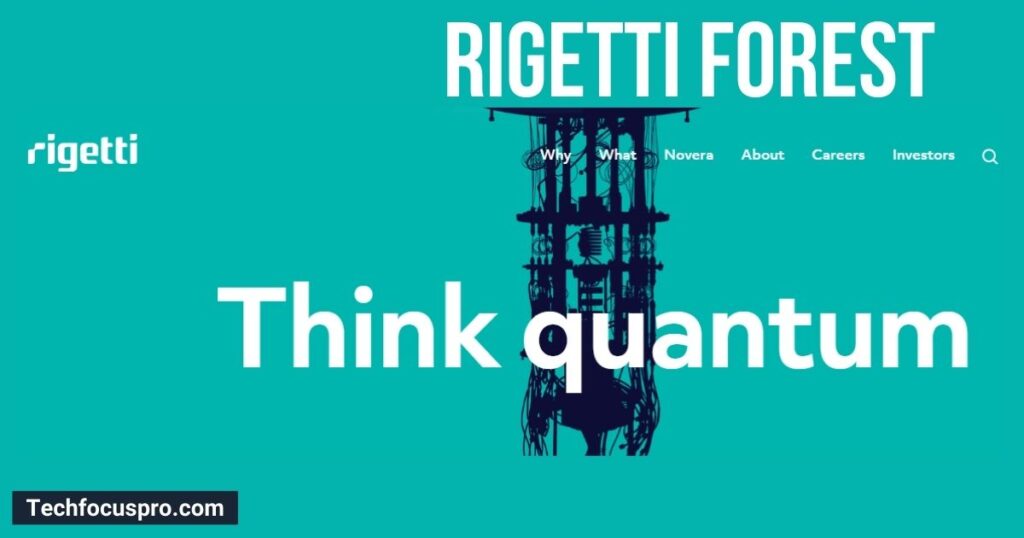
Overview: Rigetti Computing has created a full-stack quantum computing platform called Rigetti Forest. Rigetti Forest provides developers with an integrated environment where they may create, test, and execute quantum algorithms. It is made to handle both classical and quantum programming. The platform seeks to close the gap between creating valuable applications and state-of-the-art quantum research.
Key Features
- Quantum Virtual Machine (QVM): The Quantum Virtual Machine (QVM) is a simulator that enables the testing and debugging of quantum algorithms on classical hardware before their execution on quantum computers.
- PyQuil: A Python package that uses Quil (Quantum Instruction Language) to build and execute quantum programs. It makes the process of developing quantum algorithms and circuits easier.
- Forest SDK: The Forest SDK is an extensive collection of libraries and tools that offer resources for creating quantum algorithms and interacting with the quantum processors made by Rigetti.
- Integration with Classical Computing: Instruments for merging conventional and quantum code, allowing for hybrid algorithms that take advantage of each computing paradigm’s advantages.
- Cloud Access: The cloud makes real-time quantum algorithm execution possible by allowing remote access to Rigetti’s quantum processors.
Pros
- Python-Based: Quantum development is made more approachable using Python, a well-liked and simple-to-learn programming language.
- Robust Simulation: Without the requirement for real quantum hardware, the Quantum Virtual Machine offers a dependable method of testing and debugging algorithms.
- Hybrid Capabilities: Seamless integration of quantum and classical computing enables the development of more powerful and efficient algorithms.
- Community and Resources: Supported by a strong community and extensive documentation, making it easier for developers to learn and grow.
Cons
- Learning Curve: Acquiring proficiency in quantum programming principles requires a significant learning curve, similar to that of all quantum platforms.
- Performance Constraints: There are intrinsic restrictions when simulating quantum algorithms on classical hardware, which may cause the simulation to not accurately reflect the performance of real quantum processors.
- Access Restrictions: There may be restrictions on direct access to high-quality quantum hardware, which may call for special agreements or subscription arrangements.
All things considered, Rigetti Forest offers a flexible and intuitive setting for investigating quantum computing. It strikes a balance between accessibility and strong tools and features to assist both novice and seasoned developers.
D-Wave Leap
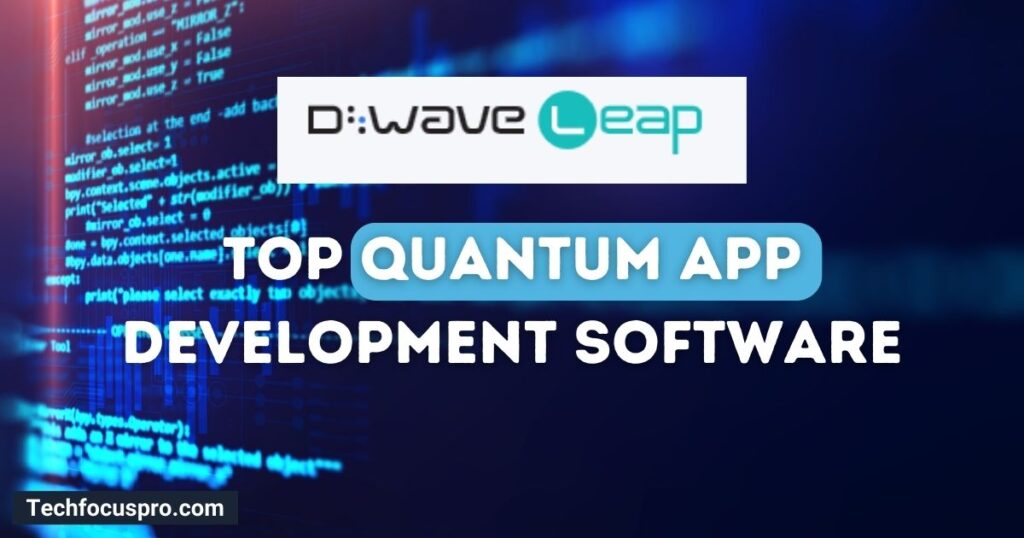
Overview: D-Wave Systems offers D-Wave Leap, a cloud-based quantum computing solution. It provides customers with resources to create quantum applications, access to D-Wave’s quantum processors, and a wide range of software tools. This platform is intended to assist companies and developers in investigating and developing applications utilizing quantum computing technologies.
Key Features
- Quantum Processing Access: Direct access to D-Wave’s advanced quantum annealing processors via the cloud.
- Integrated Development Environment (IDE): Powerful development tools and environments designed explicitly for quantum programming.
- Hybrid Solver Service: Combines quantum and classical computing to solve complex problems more effectively.
- Learning Resources: Tutorials, documentation, and examples to help users understand and utilize quantum computing.
- Community Support: Access a community of developers and experts for collaboration and assistance.
Pros
- Cloud Access: From any location with an internet connection, have simple access to state-of-the-art quantum technologies.
- User-Friendly Tools: Well-crafted resources and tools that facilitate developers’ introduction to quantum computing.
- Hybrid Solutions: Combining quantum and classical computing may produce more potent and practical solutions.
- Support and Resources: Extensive learning materials and community support to help users at any skill level.
Cons
- Performance Limitations: Quantum annealing is less versatile than other quantum computing models for specific problems.
- Access Costs: Advanced quantum hardware can be expensive and require a subscription or payment plan.
- Learning Curve: Even with available resources and assistance, understanding and applying the ideas of quantum computing can be difficult.
D-Wave Leap offers a useful and approachable entry point into quantum computing, making it simpler for anybody, from hobbyists to seasoned developers, to begin developing and experimenting with quantum applications.
Amazon Braket
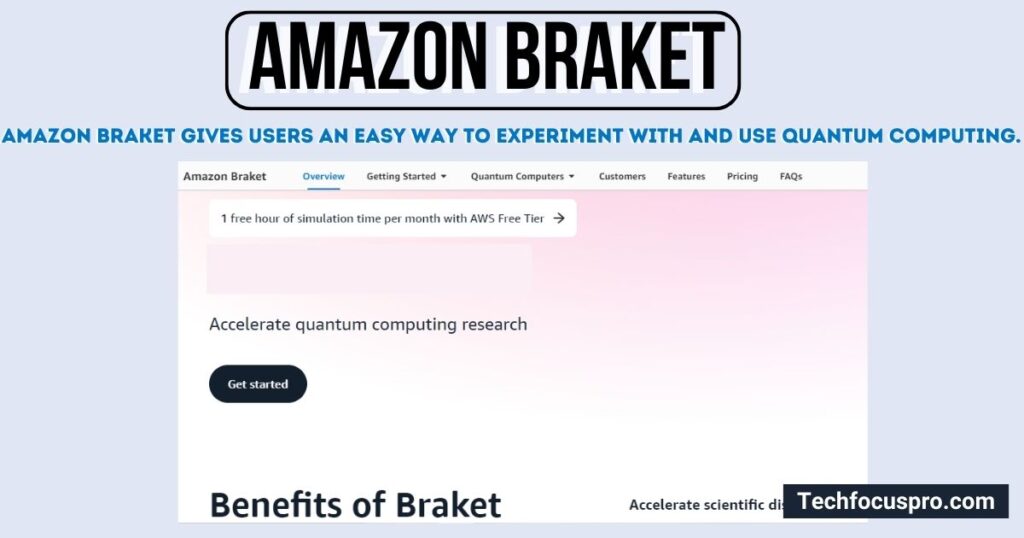
Overview: AWS’s fully managed service, Amazon Braket, allows users to experiment with and use quantum computing easily. The platform is a flexible option for a range of quantum computing research and solutions because it gives users access to multiple kinds of quantum computers from top suppliers.
Key Features
- Quantum Processing Units (QPUs): D-Wave, IonQ, and Rigetti are just a few of the leading providers of quantum technology hardware.
- Tools for Quantum Development: A complete toolkit with an intuitive user interface for creating, evaluating, and executing quantum algorithms.
- Simulation: The capacity to model quantum circuits on classical hardware, facilitating algorithm testing and debugging before executing on real quantum machines.
- Hybrid Algorithms: Tools to integrate classical and quantum tasks for creating hybrid solutions that leverage the best of both worlds.
- Managed Execution: A fully managed environment that simplifies the execution and scaling of quantum workloads.
Pros
- Versatile Hardware Access: Users can experiment with different types of quantum computers without needing specific hardware commitments.
- Integrated Environment: Easy integration with other AWS services and straightforward access to quantum computing resources.
- Simulation Capabilities: Robust simulation features allow users to develop and test applications on classical hardware before deploying on quantum processors.
- Ease of Use: Designed to be user-friendly, facilitating the adoption of quantum computing by developers with varying experience levels.
- Scalability: The managed environment makes scaling quantum experiments and applications easier as needed.
Cons
- Cost: Access to advanced quantum hardware can be costly, especially for extensive or long-term projects.
- Learning Curve: Despite its user-friendly design, quantum computing remains complex, and mastering the concepts can take time.
- Performance Variability: Performance can vary based on the type of quantum hardware used, and some tasks may be better suited to classical solutions.
Overall, Amazon Braket shines as a comprehensive Quantum App Development Software platform, providing users with the tools and resources to delve into quantum computing, experiment with different technologies, and develop innovative quantum applications.
Summary of the Top Quantum App Development Software
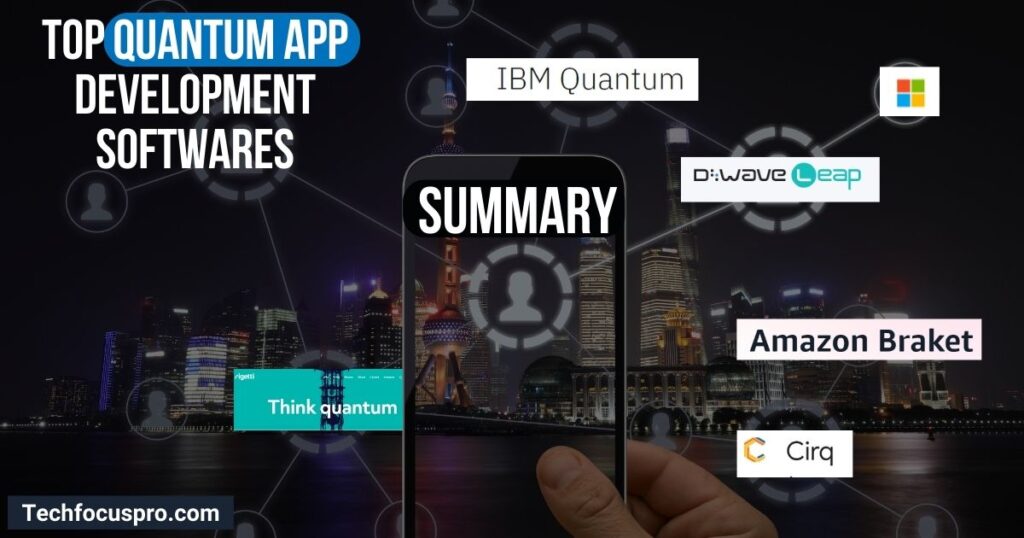
We have investigated the IBM Quantum Experience, Microsoft Quantum Development Kit, Google Cirq, Rigetti Forest, D-Wave Leap, and Amazon Braket, the six top platforms for developing quantum apps. Each platform is unique, with features and capabilities specifically designed to meet the demands of developers, academics, and companies exploring quantum computing.
- IBM Quantum Experience With its extensive toolkit and cloud-based quantum computing environment, IBM Quantum Experience is usable by both novice and seasoned developers.
- Microsoft Quantum Development Kit’s extensive collection of developer tools and easy integration with other Azure services make it stand out.
- Google Cirq For individuals with prior experience with Python programming, Google Cirq is a flexible option due to its Python-based architecture.
- Rigetti Forest is renowned for its hybrid classical-quantum computing methodology and welcoming atmosphere.
- D-Wave Leap is appropriate for certain optimization issues because it offers cloud access to hybrid solvers and quantum annealing processors.
- Amazon Braket: With access to various quantum processors and powerful simulation tools, Amazon Braket provides flexibility.
Final Recommendations
Each platform suits different needs and requirements, making it essential to choose based on specific goals:
- For Beginners and Educators: IBM Quantum Experience and Microsoft Quantum Development Kit are excellent choices due to their comprehensive learning resources and user-friendly tools.
- For Python Developers: Google Cirq is ideal for those who prefer Python and want a flexible, open-source framework.
- For Hybrid Computing Needs, Rigetti Forest and Amazon Braket are highly suitable because they can efficiently integrate classical and quantum computing.
- For Optimization Problems: D-Wave Leap is the best fit for users looking to solve specific optimization challenges using quantum annealing.
Your unique use case, current level of knowledge, and long-term objectives will all play a role in selecting the best quantum app development software. Each platform offers strong tools to support your research, development, and innovation in quantum computing.
FAQs
What is Quantum App Development?
Creating, developing, and deploying apps that use quantum computing capabilities is known as “quantum app development.” This entails developing software and algorithms for use with quantum processors, which apply the ideas of quantum physics to accomplish specific computations far more quickly than those of classical computers.
Why is quantum computing important?
Quantum computing has the potential to solve complex problems that are currently infeasible for classical computers. This includes tasks related to cryptography, material science, drug discovery, and optimization problems. These computations can be performed exponentially faster by harnessing the power of quantum mechanics.
Who can benefit from using quantum app development software?
Researchers, developers, educators, and businesses can benefit from quantum app development software. These platforms provide tools and resources to explore quantum algorithms, develop applications, and solve complex industry problems.
What software is used for quantum computing?
Various software tools are available for quantum computing, each catering to different needs and expertise levels. Some prominent quantum computing platforms include IBM Quantum Experience, Microsoft Quantum Development Kit, Google Cirq, Rigetti Forest, D-Wave Leap, and Amazon Braket. These platforms offer diverse features such as cloud-based quantum processing, hybrid computing capabilities, simulation tools, and comprehensive developer resources.
Who is leading quantum computing development?
Several companies and research institutions are leading the development of quantum computing technology. Major industry players include IBM, Google, Microsoft, Rigetti, D-Wave, and Amazon. Each organization contributes uniquely to advancing quantum computing through hardware innovation, software development, and extensive research.
What are the top applications of quantum computing currently?
Numerous intriguing uses for quantum computing exist in various domains. Top current applications include drug discovery, which speeds up the identification of new pharmaceuticals; material science, which simulates complex molecular structures; and optimization problems, which are especially helpful in supply chain management, finance, logistics, and cryptography.
What is the most famous quantum programming language?
IBM’s Qiskit is a software development kit using Python, one of the most widely used quantum programming languages. It enables users to create quantum algorithms and execute them on actual quantum computers and simulators. Other noteworthy languages and frameworks are the Forest platform from Rigetti, Google’s Cirq, and Microsoft’s Q#. Each has unique qualities suited to certain facets of the development of quantum computing.



